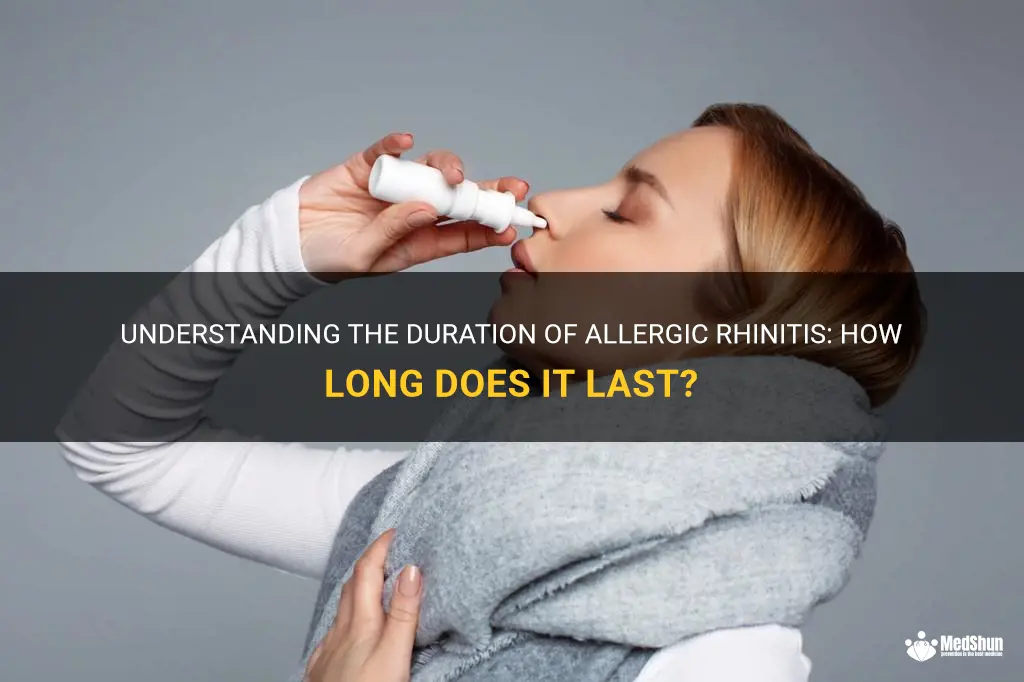
Allergic rhinitis, commonly known as hay fever, can cause frustrating symptoms that can last for days, weeks, or even months. This condition occurs when the immune system overreacts to allergens such as pollen, dust mites, or pet dander, leading to uncomfortable symptoms like sneezing, itching, and a runny or stuffy nose. While the duration of allergic rhinitis can vary from person to person, understanding how long it typically lasts can help individuals better manage their symptoms and find relief.
What You'll Learn
- How long does allergic rhinitis typically last?
- Are there different durations of allergic rhinitis depending on the severity of the symptoms?
- Can allergic rhinitis be a chronic condition that lasts for months or even years?
- Are there any factors that can impact the duration of allergic rhinitis?
- What are some effective treatments or strategies for reducing the duration of allergic rhinitis symptoms?

How long does allergic rhinitis typically last?
Allergic rhinitis is a condition that commonly affects many individuals. It is characterized by symptoms such as sneezing, runny nose, itching, and congestion, which are caused by an allergic reaction to certain substances, known as allergens. Allergic rhinitis can be triggered by various allergens like pollen, dust mites, pet dander, or mold spores.
One of the common questions people have about allergic rhinitis is how long it typically lasts. The duration of allergic rhinitis can vary from person to person, depending on several factors. In general, allergic rhinitis can last for several weeks to months, and sometimes, it can persist for years.
The duration of allergic rhinitis depends on the type and severity of the allergy. For example, seasonal allergic rhinitis, which is caused by allergens such as pollen, tends to last for a shorter period, usually a few weeks to a few months. On the other hand, perennial allergic rhinitis, which is caused by year-round allergens like dust mites or pet dander, can last for more extended periods, even all year round.
In some cases, allergic rhinitis can be a chronic condition that lasts for several years. Known as chronic allergic rhinitis, this form of the condition can cause persistent symptoms that may require long-term management. However, the duration of chronic allergic rhinitis can also vary from person to person.
It is worth noting that allergic rhinitis is a recurring condition. This means that even after the symptoms have resolved, they can reoccur when the person comes in contact with the allergen again. This is why it is essential to identify and avoid the allergen triggers as much as possible.
Managing allergic rhinitis involves both avoiding allergens and using medication to alleviate symptoms. Antihistamines, nasal corticosteroids, and decongestants are commonly used to treat allergic rhinitis. These medications can help reduce inflammation, alleviate sneezing and itching, and relieve nasal congestion.
In addition to medication, there are several lifestyle changes that can help manage allergic rhinitis and reduce its duration. These include keeping indoor spaces free of allergens, using air purifiers, washing bedding regularly, and avoiding exposure to allergens like pollen by keeping windows closed during peak pollen times.
It is advisable to consult a healthcare professional if allergic rhinitis symptoms persist for an extended period or if they are significantly impacting the quality of life. A healthcare professional can provide a diagnosis, recommend appropriate treatment options, and offer advice on managing and avoiding allergens.
In conclusion, the duration of allergic rhinitis can vary from person to person, but it typically lasts for several weeks to months. Some forms of allergic rhinitis can persist for years, while others may be chronic. Managing allergic rhinitis involves avoiding allergen triggers and using medication to alleviate symptoms. Consulting with a healthcare professional is advised for persistent or severe symptoms.
The Flu Variants Circulating in California: A Comprehensive Update
You may want to see also

Are there different durations of allergic rhinitis depending on the severity of the symptoms?
Allergic rhinitis, commonly known as hay fever, is a condition that causes inflammation and irritation of the nasal passages. It is triggered by an allergic reaction to substances such as pollen, dust mites, or pet dander. Symptoms of allergic rhinitis can vary in severity, and the duration of the condition may also vary depending on the severity of the symptoms.
Mild cases of allergic rhinitis may result in symptoms that last for a few days or up to a week. These symptoms may include nasal congestion, sneezing, runny nose, and itchy or watery eyes. The duration of these mild symptoms is often shorter, as the body is able to quickly eliminate the allergens and restore normal nasal function.
Moderate cases of allergic rhinitis may result in symptoms that last for several weeks to a couple of months. In these cases, the allergens may be more persistent, and the immune response to them may be stronger. Symptoms may include nasal congestion, sneezing, runny nose, itchy or watery eyes, and fatigue. The duration of these symptoms can be longer as the body takes more time to clear the allergens and reduce the inflammation in the nasal passages.
Severe cases of allergic rhinitis may result in symptoms that persist for months or even year-round. These cases are often referred to as perennial allergic rhinitis. The severity and duration of symptoms in these cases are often influenced by environmental factors. For example, individuals with indoor allergies may experience symptoms year-round, while those with seasonal allergies may have symptoms that align with specific times of the year when their triggers are present.
The duration of allergic rhinitis can also be affected by the treatment and management of the condition. Individuals who seek medical attention and receive appropriate treatment are likely to experience shorter durations of symptoms compared to those who do not seek treatment. Various treatment options, such as antihistamines, nasal sprays, and allergen immunotherapy, can help alleviate symptoms and reduce the duration of allergic rhinitis.
In conclusion, the duration of allergic rhinitis can vary depending on the severity of the symptoms. Mild cases may last for a few days to a week, moderate cases may last for several weeks to a couple of months, and severe cases may persist for months or year-round. Seeking appropriate treatment can help alleviate symptoms and reduce the duration of allergic rhinitis. It is important for individuals with allergic rhinitis to work with a healthcare professional to develop a personalized treatment plan to manage their symptoms effectively.
Understanding How Cold Viruses Spread and Contagiousness Factors
You may want to see also

Can allergic rhinitis be a chronic condition that lasts for months or even years?
Allergic rhinitis, also known as hay fever, is a common condition characterized by inflammation of the nasal passages due to an allergic reaction. It is typically triggered by airborne allergens such as pollen, dust mites, pet dander, and mold spores. While allergic rhinitis is usually a temporary condition that lasts for a few days or weeks, in some cases, it can become chronic and persist for months or even years.
Chronic allergic rhinitis is defined as symptoms lasting for more than four days a week and for more than four consecutive weeks. This means that if an individual experiences nasal congestion, sneezing, runny nose, and other related symptoms for an extended period of time, it is likely that they are suffering from chronic allergic rhinitis.
The exact cause of chronic allergic rhinitis is not fully understood, but it is believed to be a result of a combination of genetic and environmental factors. Some individuals may have a genetic predisposition to allergies, making them more susceptible to developing chronic allergic rhinitis. Environmental factors, such as exposure to high levels of allergens, can also contribute to the development and persistence of this condition.
Managing chronic allergic rhinitis requires a multi-faceted approach. First and foremost, it is important to identify and avoid allergens that trigger symptoms. This may involve making changes to the individual's living environment, such as keeping windows closed during high pollen seasons, using air purifiers, and regularly cleaning bedding to reduce exposure to dust mites.
In addition to allergen avoidance, medications can also be prescribed to alleviate symptoms and provide relief. Antihistamines are commonly used to reduce sneezing, itching, and runny nose, while decongestants can help relieve nasal congestion. Nasal corticosteroids are often prescribed for their anti-inflammatory properties and can effectively reduce inflammation in the nasal passages.
For individuals with severe and persistent symptoms, immunotherapy may be recommended. This involves exposing the individual to small amounts of allergens over time to build up their tolerance and reduce their sensitivity to these substances. Immunotherapy can be administered through allergy shots or under-the-tongue tablets and has been shown to provide long-term relief for many individuals with chronic allergic rhinitis.
While chronic allergic rhinitis can be bothersome and impact an individual's quality of life, taking appropriate measures to manage symptoms, avoid allergens, and seek appropriate medical treatment can greatly alleviate the burden of this condition. It is important for individuals who suspect they may be suffering from chronic allergic rhinitis to consult with a healthcare professional for an accurate diagnosis and tailored treatment plan.
Exploring the Benefits of THC for Cold and Flu Symptoms
You may want to see also

Are there any factors that can impact the duration of allergic rhinitis?
Allergic rhinitis, commonly known as hay fever, is a common condition that affects millions of people worldwide. It is characterized by symptoms such as a runny nose, sneezing, itching, and nasal congestion. The duration of allergic rhinitis can vary from person to person, and there are several factors that can influence how long the symptoms last.
First and foremost, the duration of allergic rhinitis can depend on the individual's immune system and how it reacts to allergens. Some people may have a more sensitive immune system, which means they are more likely to develop allergies and experience longer-lasting symptoms. On the other hand, individuals with a strong immune system may have shorter episodes of allergic rhinitis.
The severity of the allergen exposure can also impact the duration of allergic rhinitis. If a person is exposed to a high concentration of allergens, such as during peak pollen season or in an environment with high levels of dust mites, their symptoms may be more intense and last longer. Conversely, if a person is only exposed to a small amount of allergens, their symptoms may be milder and resolve more quickly.
Another factor that can influence the duration of allergic rhinitis is the effectiveness of treatment. Medications such as antihistamines and nasal corticosteroids can help relieve symptoms and shorten the duration of allergic rhinitis. However, if a person does not seek treatment or does not follow their prescribed treatment plan, their symptoms may persist for a longer period of time.
Individual lifestyle factors can also play a role in the duration of allergic rhinitis. For example, exposure to secondhand smoke, air pollution, or other environmental irritants can exacerbate symptoms and prolong the duration of the condition. Likewise, poor diet and lack of exercise can weaken the immune system and make it more difficult for the body to recover from allergic rhinitis.
Finally, it is important to note that allergic rhinitis can have a cyclical nature. The symptoms may come and go depending on the individual's exposure to allergens and the time of year. For example, someone with a pollen allergy may experience symptoms only during certain seasons when the pollen count is high. Once the allergen is no longer present, the symptoms may subside until the next exposure occurs.
In conclusion, the duration of allergic rhinitis can be influenced by several factors. These include the individual's immune system, the severity of allergen exposure, the effectiveness of treatment, lifestyle factors, and the cyclical nature of the condition. Understanding these factors can help individuals manage their symptoms and find relief from allergic rhinitis.
Exploring the Compatibility: Can You Safely Take Ibuprofen with Sambucol Cold and Flu?
You may want to see also

What are some effective treatments or strategies for reducing the duration of allergic rhinitis symptoms?
Allergic rhinitis, also known as hay fever, is a condition characterized by inflammation of the nasal passages due to an allergic reaction. It is estimated that around 10-30% of the global population suffers from allergic rhinitis, making it a common and bothersome condition. Symptoms of allergic rhinitis include sneezing, congestion, itching, and a runny nose. These symptoms can be both frustrating and debilitating, impacting a person's quality of life. Fortunately, there are several effective treatments and strategies that can help reduce the duration of allergic rhinitis symptoms.
One of the most common treatments for allergic rhinitis is the use of nasal corticosteroids. These medications work by reducing inflammation in the nasal passages, resulting in a decrease in symptoms. Nasal corticosteroids are available both over-the-counter and by prescription, and they are typically used on a daily basis for optimal results. Examples of nasal corticosteroids include fluticasone, mometasone, and budesonide.
Another effective treatment for allergic rhinitis is the use of antihistamines. Antihistamines work by blocking the effects of histamine, a chemical that is released during an allergic reaction. By blocking histamine, antihistamines help to relieve symptoms such as sneezing, itching, and a runny nose. Antihistamines can be taken orally or used as nasal sprays, and they are available in both over-the-counter and prescription forms. Examples of antihistamines include loratadine, cetirizine, and fexofenadine.
In addition to medication, there are several non-pharmacological strategies that can help reduce the duration of allergic rhinitis symptoms. One such strategy is allergen avoidance. Allergen avoidance involves identifying and avoiding the specific triggers that cause allergic reactions. Common allergens include pollen, dust mites, pet dander, and mold. By minimizing exposure to these allergens, individuals with allergic rhinitis can significantly reduce the severity and duration of their symptoms. Strategies for allergen avoidance include keeping windows closed during peak pollen seasons, using air purifiers, washing bedding in hot water, and keeping pets out of the bedroom.
Another non-pharmacological strategy for reducing the duration of allergic rhinitis symptoms is nasal irrigation. Nasal irrigation involves using a saline solution to flush out the nasal passages, helping to remove allergens and irritants. Nasal irrigation can be done using a neti pot or a saline nasal spray, and it can be particularly effective for relieving congestion and improving nasal airflow. It is important to use sterile water or a saline solution when performing nasal irrigation to avoid the risk of infection.
Finally, immunotherapy may be considered for individuals with severe and persistent allergic rhinitis symptoms. Immunotherapy, also known as allergy shots, involves gradually exposing the individual to small amounts of the allergen over time, with the goal of desensitizing the immune system to the allergen. This can result in a significant reduction in symptoms and the need for medication. Immunotherapy is typically administered by a healthcare professional and requires regular visits over a period of several months or years.
In conclusion, allergic rhinitis is a common condition that can cause significant discomfort and impact a person's quality of life. However, by using effective treatments and strategies, the duration of allergic rhinitis symptoms can be reduced. Medications such as nasal corticosteroids and antihistamines can help to relieve inflammation and block the effects of histamine. Non-pharmacological strategies such as allergen avoidance and nasal irrigation can also be effective in reducing symptoms. For individuals with severe and persistent symptoms, immunotherapy may be considered. By combining these treatments and strategies, individuals with allergic rhinitis can find relief and enjoy a better quality of life.
Should You Get the Flu Shot While Dealing with a Cold?
You may want to see also
Frequently asked questions
An allergic rhinitis episode, also known as hay fever, can last for several days to several weeks, depending on the individual and the severity of their symptoms. Some people may experience symptoms for a shorter period of time, while others may have symptoms that persist for longer periods.
Yes, in some cases, allergic rhinitis can last for several months or even longer. This is often referred to as chronic allergic rhinitis. Chronic allergic rhinitis occurs when a person is exposed to allergens on a regular basis, such as in the case of dust mite or pet allergies. Symptoms of chronic allergic rhinitis may be milder than those of acute episodes, but can still be bothersome and disrupt daily functioning.
In some cases, allergic rhinitis symptoms may go away on their own, particularly if the allergen to which an individual is sensitive is no longer present. For example, seasonal allergic rhinitis may resolve when the pollen count decreases. However, it is important to note that allergic rhinitis is a chronic condition, and symptoms often return when a person is re-exposed to the allergen. Therefore, it is typically recommended to seek treatment for allergic rhinitis in order to manage symptoms and improve quality of life.







